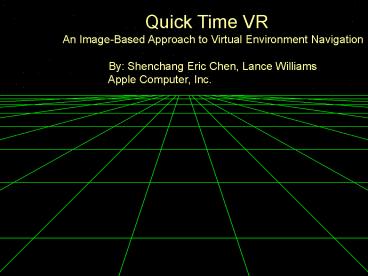Quick Time VR - PowerPoint PPT Presentation
1 / 22
Title: Quick Time VR
1
Quick Time VR An Image-Based
Approach to Virtual Environment Navigation
By Shenchang Eric Chen, Lance Williams
Apple Computer, Inc.
2
(No Transcript)
3
(No Transcript)
4
(No Transcript)
5
Cons 1- Only 3 degrees of freedom (plus zoom)
(you can point the camera in any direction,
but you can't move the camera) 2- Scenes must be
static (you can do looping animations, but
user-controlled objects don't work well) 3-
Storage requirements can be large
6
Pros 1- Rendering time is proportional to view
size, not scene complexity. 2- No special 3D
hardware is necessary for reasonable
performance with real-time rendering. 3-
Rendering is just a simple warping of a portion
of the full image.
7
(No Transcript)
8
- Memory Usage
- Environment maps are diced into tiles to optimize
memory page usage - Each tile is converted to a MipMap to reduce
swapping irrespective of zoom - Finally the tiles are compressed
9
- QuickTime specific stuff
- 3 Tracks -- Node with links to other nodes,
Environment map (the scene), Hot spot masks - Support for object rotation (orbiting camera)
- Event driven interaction follows link to another
node when a hot-spot is clicked
10
(No Transcript)
11
View Interpolation for Image Synthesis By
Shenchang Eric Chen, Lance Williams Apple
Computer, Inc.
12
(No Transcript)
13
Interpolation requires d 1 images where d is
the number of degrees of freedom that the camera
has. For QTVR, the camera only needs 3 degrees
of freedom (because the other 3 are implicitly
handled) Linear weights for each image are
computed to sum to 1. (Linear interpolation)
14
- Primary objective is performance
- Correspondence maps are precomputed between every
pair of images. - Maps every source pixel to a destination location
- Maps are needed in both directions due to holes
- Stored as vector offsets
- Grouped into quadtree blocks
- Interpolation is computed for entire block at a
time - Blocks are sorted by their average source image z
value and displayed back to front in order to
handle occlusions without the overhead of a
z-buffer
15
(No Transcript)
16
(No Transcript)
17
Holes
Interpolated from neighbor pixels
18
(No Transcript)
19
Motion Blur Jerky motion caused by instant
sampling--aliasing in temporal domain Fixed by
supersampling over time and averaging images
together
20
(No Transcript)
21
Shadows First render shadows from two or more
light sources Compute morph-map only for
shadows Interpolate shadows from other light
sources
22
(No Transcript)































